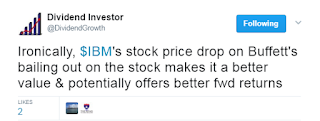Last Friday, I was surprised to hear about Warren Buffett's decision to sell roughly a third of Berkshire Hathaway's stake in IBM. Although I admittedly don't hold Mr. Buffett in as high regard as other bloggers, I still respect his long-term track record as a stock-picker and empire builder. When justifying his partial sale, Buffett indicated that his assumptions relating the the valuation of IBM had changed since he started buying his stake six years ago and also referred to the company's strong competitors. Much like his defense of partnering with 3G Capital on recent deals, I found his justification for selling a third of his shares in IBM lacking in substance.
Instead of getting stuck in the weeds and overanalyzing Buffett's recent trade, I found a thought provoking tweet from one of my favorite dividend bloggers @dividendgrowth
For those who thought IBM was a great deal at $159 before Buffett disclosed his partial exit, clearly the 5% discount should make the current valuation even more compelling. The trailing P/E of about 12.5X and the dividend yield of 3.9% must look extra tempting to investors who choose to ignore the whims of America's most famous investor. The above tweet made me wonder if Buffett makes the same mistake as me when selling his investments too early.
Each quarter when Berkshire Hathaway files a 13-F form which discloses positions in their equity portfolio, there's a site that summarizes the filing to separate which positions Berkshire has added to and which positions have shrunk. Looking at the 2016 year-end filing, I thought it would be interesting to calculate the year-to-date total return on the eight positions that Berkshire materially decreased or exited in the quarter ending December 31, 2016. The year-to-date total returns (including dividends) for these eight positions is shown below.
Wal-mart (WMT) = +10.9%
Verizon (VZ) = -10.5%
Liberty Media B (LMCB) = +9.8%
Deere & Co (DE) = +9.9%
Kinder Morgan (KMI) = -1.5%
Lee Enterprises (LEE )= -20.7%
Liberty Media A (LMCA) = -0.5%
ServiceNow (NOW ) = -15.8%
Average return of stocks sold = -2.3%
Granted, five months of returns calculated from a small sample of eight stocks doesn't provide sufficient evidence to conclude that Buffett does a better job selling his investments than the average retail stock-picker. One must also consider that once the 13-F of Berkshire is made public, certain investors and funds who blindly follow Buffett's every move scramble to sell the shares that he divested. It's also worth noting that the volume of shares associated with Berkshire's positions can create downward pressure and momentum on a company's share price when Berkshire starts shrinking their position. Despite all those disclaimers, the above results do partially support Buffett's status as seasoned investor. Although no one can consistently sell stock at the highest price, nor can they buy it at the lowest price, but avoiding big losers helps investors conserve their capital in order to continue making investments.
Although IBM has never been at the top of my watch list due to shrinking revenues and EPS supported mainly through share buybacks, in my view, Buffett's partial exit doesn't make it a more appealing long-term investment. Like many large-cap companies, IBM must determine how to grow their top line or at the very least maintain it in order to appease shareholders without adding excessive debt to their capital structure. Will IBM find that elusive top line growth without such a large investment of sticky capital from Warren Buffett? The answer to that question will ultimately determine if IBM's current stock price represents a good value or a value trap.
Does Warren Buffett's investment in a company make you more or less likely to invest in that company?

Honestly, I feel that people who analyze and invest in the stock market are kinda cool and really smart. I tried to grasp this whole business once but it totally flew over me.
ReplyDelete